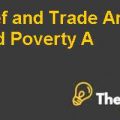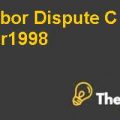
Winfield Refuse Management Inc Case Solution
Winfield Refuse Management Inc
Introduction
Winfield refuse was founded by Thomas Winfield in 1972. The company grew through out its life by strategic acquisitions and organic growth.The company is providing its services to about half a million customers in nine states, including industrial, commercial and residential customers.
Sinceits inception, the company is a family business with most of the members of the board from the family however,after 1980s the outside professionals became apart of the company’s management. Currently, the company’s CEO Leo Strumpet is leading the major affairs of the company’s operations.
It has been the company’s policy from the start to use the equity funds to finance all its operations, avoiding long-term debts and interest bearing debts.The company was having steady cash flow, which it achieved through short term bank loans and public offerings. About 79% shares are held by the Win field family and the senior management of the company, remaining are being distributed and traded in over-the-counter market.
Nature of the Business
Winfield refuse has 22 landfills, 26 transfer stations and material recovery facilities, serving 33 collection centers.
Problem Statement
Winfield refuse wants to solidify its competitive advantage in the market.For this purpose it is planning to acquire a larger company in the same industry.The company wants to maintain a competitive cost position as well as expanding its operations beyond current geographical boundaries.
After significant study and evaluation of options, the management is ofthe view to acquire Mott-Pliese Integrated solutions (MPIS), a waste management company with its operations in Ohio, Indiana, Tennessee, and Pennsylvania. After negotiations an agreement has been reached and acquisition price was set at $125 million.
For this acquisition the company has not enough finance, therefore external financing will be required. For this the company is considering two options:
• Finance by issuing new common stock from public
• Issue long term debt in form of bonds to insurance company
Board meeting is in two days in which the decision needs to be taken, therefore the company’s chief financial officer, Sheene, has to analyze thoroughly and prepare presentation on financing options so that a resolution of this matter is reached in the upcoming meeting.
Industry situation
• Non-Hazardous; includes various types of industrial waste and municipal solid waste comprises of trash and garbage.
Hazardous waste material is mainly produced by the manufacturing industries and is strictly regulated by the state.
Municipal solid waste is managed by the municipalities themselves, but 80% of this is outsourced to private sectors. Private operators typically collect process and dispose non-hazardous commercial and industrial waste. Disposing operation is extensively asset oriented and requires thecompany to have local vehicles for waste collection and also long distance vehicles. Transfer station, material recovery facilities and disposal facilities and landfills are also examples of this.
There are many segments of the industry. Two of the main segments are Waste Management Inc. and Republic services, both are national traded business. Most local and regional waste companies are operating as private companies. The market has a slow growth but has steady cash flows with steady demand........................
This is just a sample partial case solution. Please place the order on the website to order your own originally done case solution.













